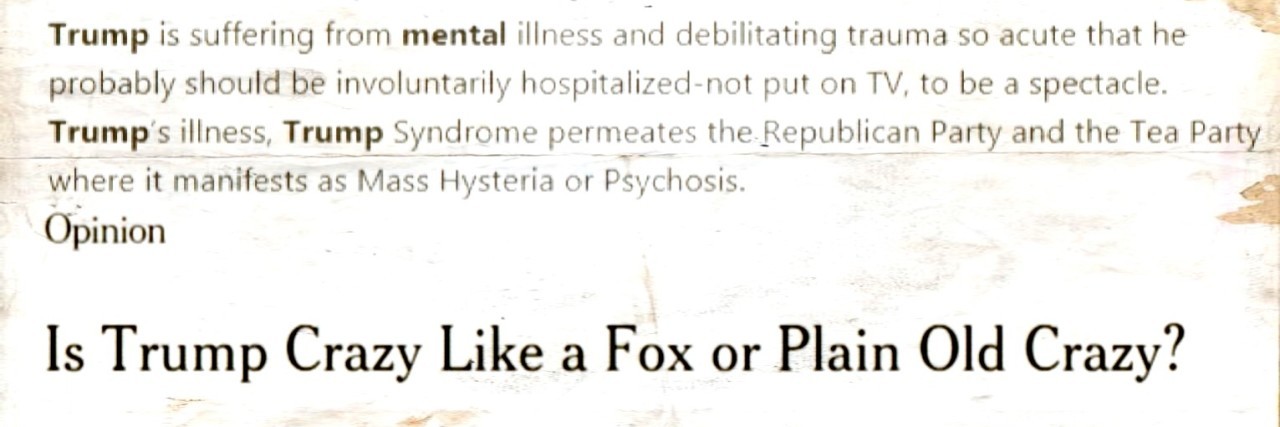Editor’s note: This story reflects an individual’s experience and is not an endorsement from The Mighty. We believe in sharing a variety of perspectives from our community.
To the people who are currently trying to make a case against Donald Trump by calling him mentally ill: Please — if just for a minute — stop.
I don’t care what your views are. I don’t care if you are a Democrat, or a Republican, or a member of the Green Party, or if the most political you’ve ever been is when you helped your kid make posters to be the president of student council. Please stop trying to label Trump as “mentally ill,” and leaving it at that. Please stop trying to use mental illness as an excuse to call him unfit.
Here’s why:
Mental illness is a topic that is endlessly shamed and stigmatized. Mental illness is something I struggle to be open about every day. From the cop who educated my class that people with my disorder would be the ones to murder our spouses, to the dozens of people who mocked mental illness/health unknowingly to my face, I have experienced my fair share of stigma. So many of us live with a fear of rejection and hatred if we speak up, and, truly, one of the biggest figures of stigma you can possibly throw in front of us is Donald Trump.
So, do not place him in a box with me — with us.
Trump is, in my opinion, a harsh, mean, bully of a person. Simply that. While Trump builds walls, so many of us with mental health issues are trying to tear them down; while he causes damage to countless lives, we are trying to rebuild our own. He doesn’t deserve to have excuses made for him using something that is already placed under fire; using a topic that 1 in 5 people struggle with. While some of you stand back and point the mentally-ill finger at him, you aren’t considering the hundreds of people you’ve passed today who have struggled with exactly what you are presenting as an accusing statement. You aren’t considering your cousin who struggles with depression, or your parent who tackled anxiety, or your friend with an eating disorder. We didn’t ask for our disorders; we didn’t ask to be ill, or stigmatized. But Trump is conscious of what he is doing, even if his decisions are harmful and vicious. He is conscious of the fact he is currently revoking the insurance that pays for people’s psychiatric medications, and that he has set in place a substantial budget cut for mental health over the next four years.
For those of you without any education on the topic, who are calling Trump “mentally ill” because you decide it to be fitting: you are hurting those of us who are, and who live with it every day, who would never consider hurting so much as a fly.
Newsflash: “Mentally ill” isn’t a diagnosis.
And, right now, we don’t have nearly enough everyday advocates. Our struggles only continue to get used as an excuse for hate. Calling Trump mentally ill is not an end to some sort of political tragedy; it’s the beginning of another wave of stigma — that which keeps us silent, broken and fearful each day. Mental health professionals can claim from a distance that Trump has a mental illness — and they may be right — but when it comes down to it, those who live with mental illness every day don’t have a bold voice in society. Right now, our label, due in part to Trump, is “unfit” and “dangerous.”
Someone is not unfit to be human because of their mental illness. Someone is not a bad person because of their disorder. Someone is not made dangerous by a diagnosis. What is dangerous is continuing to increase stigma by placing blame for a man who is conscious of the destructive choices he’s made on the made-up diagnosis of “mentally unfit.” What is dangerous is adding to the pressure of silence against mental illnesses that steal millions of lives each year. Those of you calling Trump the same stigmatizing phrases over and over again are not only wrong, but hurtful. You are hurting those of us who spend each day hiding our damage with the fear we will be seen as dangerous as the most prominent point of misguided, stigmatized focus if we come forward. Mental health awareness is not a topic that deserves to be dedicated to Trump, claiming his “danger” as a president. Mental health must be assigned to the whole of our humanity — advocacy for those who have overcome, those who struggle with their mental health every day, and those who are fighting for recovery.
Discussion about mental health needs to not be about increasing separation, but breaking stigma; not about potential “danger,” but about the effects of support, therapy and proper treatment. Mental health awareness does not and should not belong to Trump. This awareness, and reframing it in a more positive light, must belong to the millions of us who struggle in silence: a silence that must now be broken to survive.
If you or someone you know needs help, visit our suicide prevention resources page.
If you need support right now, call the National Suicide Prevention Lifeline at 1-800-273-8255, the Trevor Project at 1-866-488-7386 or reach the Crisis Text Line by texting “START” to 741-741.
We want to hear your story. Become a Mighty contributor here.
Image via contributor.

